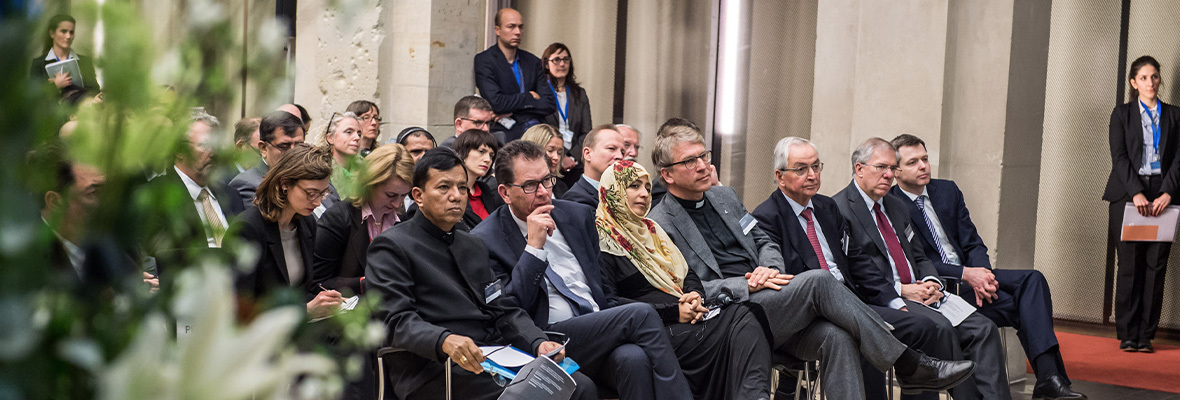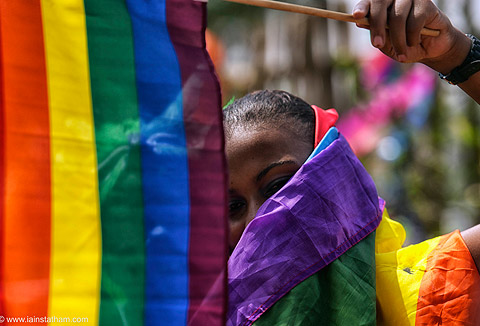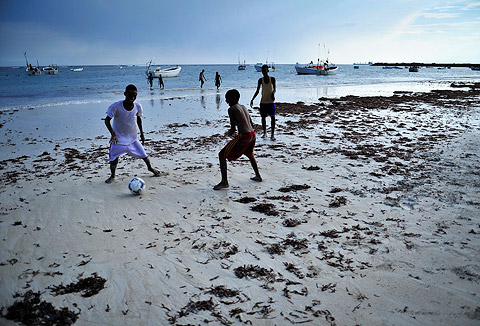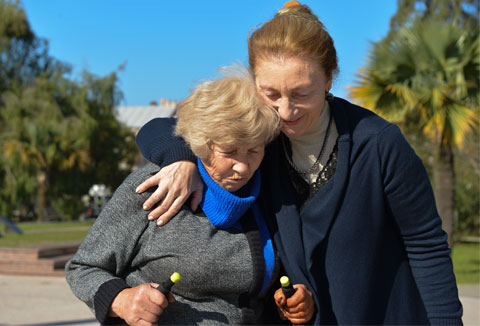Prohibited Pride
Despite a ban on homosexuality, LGBT Ugandans celebrate their pride. Kasha Nabagesera, Right Livelihood Award laureate, spoke about the situation on site.

Over 80 percent of the world population is involved in a faith community. The Federal Ministry for Economic Cooperation and Development (BMZ) held a conference in Berlin to explore the development potential of working with religious leaders on February 17 and 18, 2016.
“Religion practices an ethics of sufficiency; it is sustainability.” In his opening address, Development Minister Dr Gerd Müller talked about the direct link between the United Nation’s Sustainable Development Goals (SDG) and the world religions. Minister Müller emphasised that religion, like development cooperation, served the poor, the weak, and the excluded, expounding such values as equality, sufficiency, and a social and ecological order. So working with religious leaders, Müller concluded, was essential for meeting the SDGs.
Together with State Secretary Silberhorn, Vice-Chair of the Deutsche Gesellschaft für Internationale Zusammenarbeit (GIZ) Management Board Dr Beier, and over 70 bilateral and multilateral representatives from religious denominations and civil society, the International Partnership on Religion and Sustainable Development (PaRD) was launched to promote this cooperation. The Partnership will provide a formal structure for international dialogue among policy makers, civil society and the world religions. A secretariat operated by GIZ will coordinate concrete products and projects. The Berlin conference represented a first important step for the new initiative.
At the opening event, Müller appealed to all the religious leaders and stakeholders from politics and civil society present to use the opportunity to take on an active role and not just leave solutions to the politicians. He emphasized that faith and religion should not be misappropriated to justify wars and destruction, discrimination and exclusion. He added that the golden rule, the ethic of reciprocity embodied in the concept of ‘do unto others as you would have them do unto you’, was an integral part of every major religion. Along with religious leaders, the BMZ also invited important human rights activists such as Yemini Nobel Peace Prize Laureate Tawakkol Karman and Pakistani lawyer at the Lahore High Court Asma Jahangir to the conference.
Keynote speaker Pastor Olav Fykse Tveit, General Secretary of the World Council of Churches, welcomed the new initiative: He expressed optimism that close cooperation between politics and faith communities could contribute to achieving the SDGs, adding: “This is a moment of hope!” A performance by the Damascus String Quintet, composed of Syrian refugees, was a musical highlight of the evening. The musicians played two pieces from contemporary Syrian composers and created an atmosphere of quiet reflection.
During the podium discussion, Tawakkol Karman, former German Minister of the Environment, the Archbishop Sebastian Francis Shaw from of Lahore, Pakistan and Eric Postel from the USAID development organisation posed questions about religion’s contribution could be and what concrete cooperation might entail.
The second day of the conference involved four workshops on the planet, people, prosperity and peace. Religious leaders like Dutch Rabbi Avraham Soetendorp and Rev. Jack Mamven, a youth pastor from Nigeria, members of the German Bundestag and representatives of civil society organisations like MISEREOR, Islamic Relief, and Brot für die Welt led in depth conversations to explore each respective topic. The workshops touched on challenging and critical issues, such as discrimination against girls and women, persecution of homosexuals, and how converts are treated in different religious communities.
During the conference, the authors of “Voices from Religions on Sustainable Development” were on hand to present their book commissioned by the BMZ and realized by GIZ’s “Values, Religion and Development” sector program. It is a collection of essays by 28 authors from nine religious confessions and one indigenous tradition on their individual views of sustainable development and how their faith communities are contributing to the SDGs.
The conference was organised by the GIZ’s Development Policy Forum together with the “Values, Religion and Development” sector program on behalf of the BMZ.
A copy of “Voices from Religions on Sustainable Development” can be ordered via Email.
Photo: Archbishop Shaw, Development Minister Müller, Nobel Prize Laureate Karman, Olav Fykse Tveit, General Secretary of the World Council of Churches, Klaus Töpfer (formerly of UNEP), Eric Poster (USAID), Parliamentary State Secretary Thomas Silberhorn. Foto: GIZ/Rühmeier

Despite a ban on homosexuality, LGBT Ugandans celebrate their pride. Kasha Nabagesera, Right Livelihood Award laureate, spoke about the situation on site.

Beyond the world’s attention, violent crimes take place on unstable ground: Child piracy creates a legal dilemma that puts vulnerable juveniles at risk.

Basic Income Guarantees (BIG) were once laughed at as utopian. But they are already today changing the lives of millions worldwide – especially in the south.

The Caucasus has been splintered by war into Georgia, South Ossetia, and Abkhazia. Three women are harnessing words to counter barbed wire.